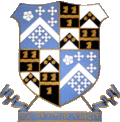The Latymer School facts for kids
Quick facts for kids The Latymer School |
|
|---|---|
 |
|
| Address | |
|
Haselbury Road
, Greater London
,
N9 9TN
England
|
|
| Coordinates | 51°37′30″N 0°04′28″W / 51.6250°N 0.0744°W |
| Information | |
| Type | Voluntary aided grammar school |
| Motto | Latin: Qui Patitur Vincit ("He who endures wins") |
| Established | 1624 |
| Founder | Edward Latymer |
| Local authority | Enfield Council |
| Department for Education URN | 102055 Tables |
| Ofsted | Reports |
| Chair of the Governing Board | Stephen Way |
| Headteacher | Maureen Cobbett |
| Staff | 141 (as of Nov 2016) |
| Gender | Coeducational |
| Age | 11 to 18 |
| Enrolment | 1365 (2016–17 Academic Year) |
| Houses | Ashworth Dolbé Keats Lamb Latymer Wyatt |
| Colour(s) | Royal & Navy Blue |
| Website | https://www.latymer.co.uk |
The Latymer School is a selective, mixed grammar school in Edmonton, London, England, established in 1624 by Edward Latymer.
History and traditions
Latymer was established in 1624 on Church Street, Edmonton by bequest of Edward Latymer, a London City merchant in Hammersmith. Although most of his wealth passed to the people of Hammersmith and the Parish of St Dunstan's (now Latymer Upper School), he named certain properties and estates to fund the education and livelihoods of "eight poore boies of Edmonton" with a doublet, a pair of breeches, a shirt, a pair of woollen stockings and shoes distributed biannually on Ascension Day and All Saints' Day. Pupils wore the red Latymer cross on their sleeves.
In 1662, John Wild of Edmonton made a bequest for the annual maintenance of a schoolmaster and a poor scholar at Cambridge. In 1697, Thomas Style extended the bequest to fund the education of "twenty poor boys ... Grammar and Latin tongue." Several similar benefactions produced about £550 per annum, which funded the instruction of more than one hundred boys, of which sixty were clothed. In 1811, Ann Wyatt, a widow from Hackney, willed her Navy Annuities for the construction and maintenance of a new school. The school-room was built in 1811 in accordance to her will.
The school did not take on Latymer's name for some centuries; when it finally did, it was known as Latymer's School. At some point, the apostrophe was dropped and the name modified to the Latymer School. It has been situated on its present site since 1910, when it also became coeducational.
The school motto, Qui Patitur Vincit ('Who endures wins'), was also adopted in 1910 by Richard Ashworth, then headmaster. Prior to this, the motto was Palmam Qui Meruit Ferat ('Let he who bears the palm (of honour) deserve it').
The school has formal links with St John's College, Cambridge (Edward Latymer's College) and Corpus Christi College, Cambridge (the College of Edward Latymer's father, William Latymer) which have endowments which may be used for the furtherance of the studies of former Latymer pupils at those colleges.
In 1967 the school switched to a comprehensive intake as a result of Circular 10/65, a request from the Labour government to local education authorities to plan for conversion to a fully comprehensive education system. However, a certain amount of informal selection still took place in liaison with local primary schools.
In 1988, Latymer took advantage of the Education Reform Act 1988 to become a Grant-Maintained school with selective entrance exams once more. Grant-maintained status was abolished by the School Standards and Framework Act 1998 and Latymer reverted to voluntary aided status.
Ofsted judgement and school ranking
The school underwent its most recent Ofsted inspection on 24 March 2022, when it received an overall grade of 'Good', after having previously been graded 'Outstanding' on 25 January 2008. In the 2023 'Parent Power' rankings, published by The Times newspaper, the school was ranked 21st in the UK and seventh-best in London. In that same year, 86.5% of GCSE examinations achieved A-grades (15th nationwide), and 61.7% of entries gained A-grades at A-level, while 83% obtained A or B grades (36th nationwide).
Notable former pupils
In entertainment
- Evelyn Ankers, actress, known as "the Queen of the B movies"
- Clare-Hope Ashitey, actress
- Eileen Atkins, actress
- Bruce Forsyth, entertainer
- Tim Pope, director
- Leslie Welch, radio and television personality, the Memory Man
- Aubrey Woods, actor, best known for performing "The Candy Man" in the 1971 film Willy Wonka and the Chocolate Factory
In politics
- Syed Kamall, Conservative MEP
- Albert Meltzer, anarcho-communist writer
- Ash Sarkar, British journalist and left-wing political activist
- David Walder, Conservative Party politician
In academia
- Mark Abrams, social scientist
- John Horlock, vice-chancellor, Open University, 1981–90
- Liz Jolly, Chief Librarian, The British Library (from 2018)
- John Prebble, historian and novelist
- Stephen Wheatcroft, economist and civil aviation expert influential in founding of British Airways
- Yorick Wilks, artificial intelligence pioneer
In sport
- Ted Blake, trampoline pioneer
- Johnny Haynes, former Fulham F.C. and England football captain
- Leslie Medley, former Spurs and England footballer.
- Arthur Sanders, footballer
- Mark Warburton, formerly manager of Queens Park Rangers
In music
- James Blake, British electronic artist
- Grace Chatto, cellist in British electronic music band Clean Bandit
- Richard Cook, music writer, former executive of PolyGram records
- B.J. Wilson, original drummer of Procol Harum
Other
- Nick Holtam, 78th bishop of Salisbury

